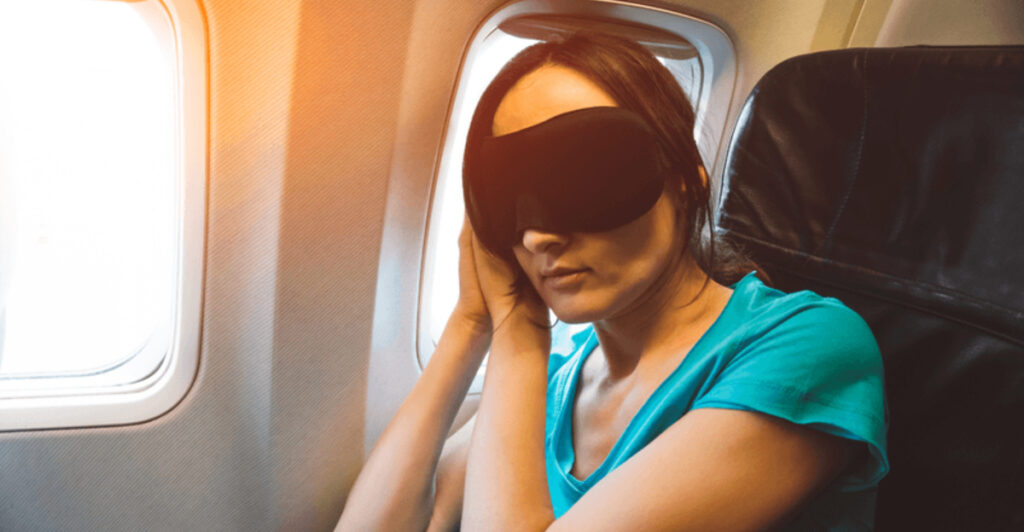Crossing time zones can be thrilling—but jet lag? Not so much. That groggy, foggy feeling hits hard when your internal clock is out of sync. Fortunately, seasoned travelers have shared their go-to tricks to fight fatigue and bounce back faster. Here are 16 jet lag remedies that frequent flyers actually swear by.
1. Adjust Your Schedule Before You Fly
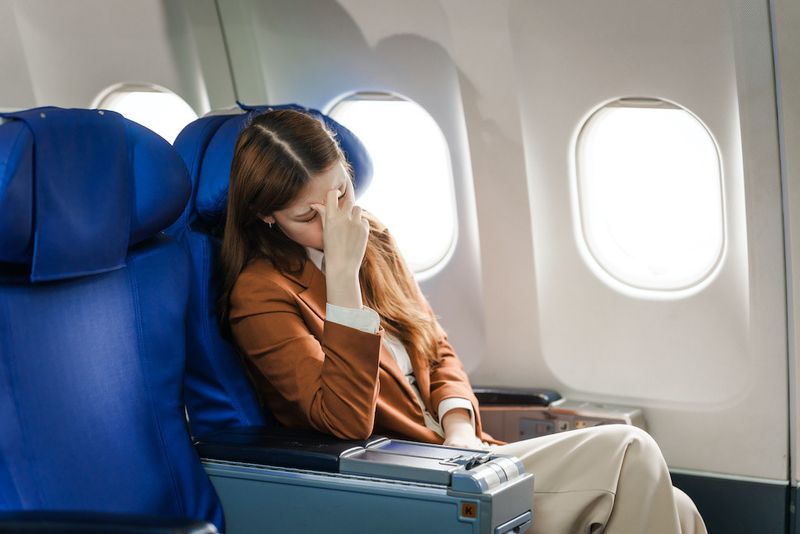
Gradually shifting your daily routine to align with your destination’s time zone can help. Begin adjusting your sleep and meal times a few days before your trip. This subtle change can ease your transition and mitigate the effects of jet lag. Consider eating meals closer to your destination’s local time.
By making these small adjustments, your body starts to acclimate even before you step on the plane. It’s a proactive strategy that many frequent flyers endorse. This simple yet effective method can significantly lessen the shock to your body’s internal clock.
Planning ahead is crucial. Such gradual changes can reduce the intensity of jet lag symptoms and help you feel more rested upon arrival.
2. Hydrate Like It’s Your Job

Staying hydrated is essential for combating jet lag. Airplane cabins are notoriously dry, which can exacerbate the feeling of fatigue and dehydration. Drinking plenty of water before, during, and after your flight is a simple yet powerful remedy.
Dehydration can worsen jet lag symptoms, making you feel more tired and sluggish. Frequent flyers recommend avoiding alcohol and caffeine, which can dehydrate you further. Instead, opt for water or herbal teas to keep your hydration levels high.
By prioritizing hydration, you support your body’s natural rhythms and recovery processes. It’s an easy, effective strategy to help your body adjust to new time zones swiftly and comfortably.
3. Avoid Alcohol and Caffeine in Flight

While tempting, alcohol and caffeine can interfere with your sleep cycle and lead to dehydration. On a long-haul flight, these effects can amplify jet lag symptoms. Frequent flyers suggest sticking to water or herbal teas instead.
Alcohol might help you relax, but it disrupts sleep patterns. Caffeine, meanwhile, can leave you feeling jittery and awake when you should be resting. By avoiding these substances, you help maintain your body’s natural rhythms.
Consider the timing of your intake if you must indulge. It’s wiser to consume these beverages earlier in the day, ensuring your body is ready to rest when it needs to.
4. Use Melatonin Wisely

Melatonin, a hormone that regulates sleep-wake cycles, can be a helpful ally against jet lag. Taking it 30 minutes before your intended bedtime in the new time zone may smooth the transition.
Not all travelers find melatonin effective, but many swear by its ability to reset their internal clocks. It’s a non-habit-forming supplement that mimics your body’s natural signals to wind down and sleep.
Consult a healthcare professional to determine the right dosage for your needs. Used wisely, melatonin can help you achieve restful sleep and minimize the grogginess associated with crossing time zones.
5. Nap Smartly
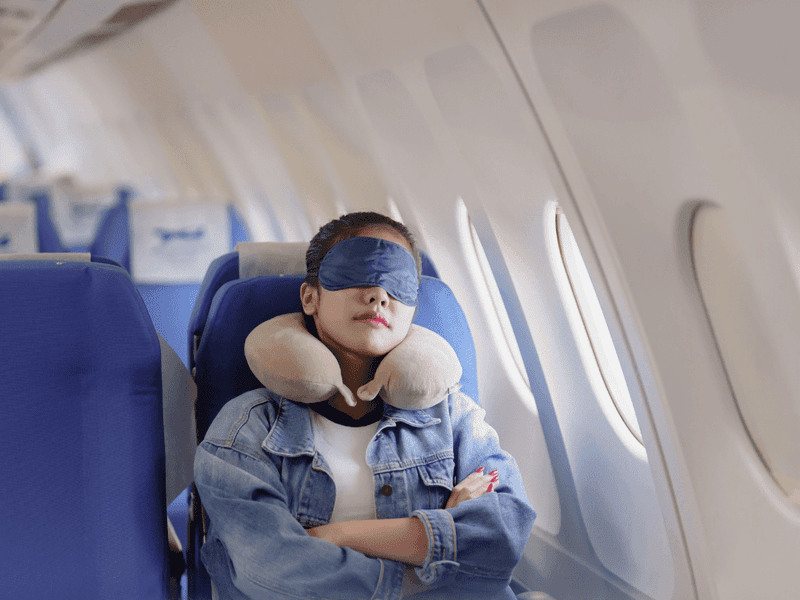
When you’re utterly exhausted, a short nap can be a lifesaver. A quick 20-minute power nap is often recommended to rejuvenate without interfering with your ability to sleep at night.
Avoid longer naps, as they can confuse your body and disrupt nighttime sleep. Timing is crucial: nap early in the afternoon to prevent a negative impact on your night’s rest. This can be particularly helpful on the first day in a new time zone.
Napping smartly helps manage immediate fatigue while supporting your body’s longer-term adjustment. Listen to your body, but be disciplined with the nap duration for best results.
6. Soak Up Natural Light
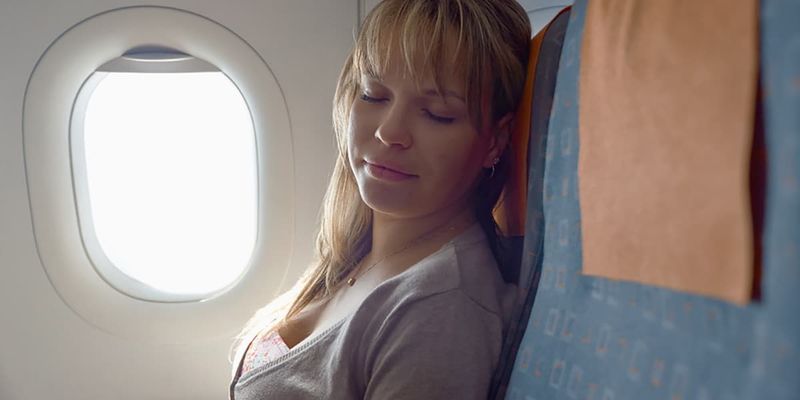
Natural light is a potent tool for resetting your body’s internal clock. After a long flight, spend some time outdoors to help your body adapt to the new time zone. Sunlight exposure can significantly influence your circadian rhythm.
Morning light signals it’s time to wake up and be active, while evening light helps adjust your internal clock for nighttime. This natural cue is particularly effective when traveling eastward.
Whether you’re exploring new sights or enjoying a leisurely walk, natural light exposure is a simple, free remedy. It’s about aligning your body with the natural world to ease jet lag symptoms efficiently.
7. Get Moving
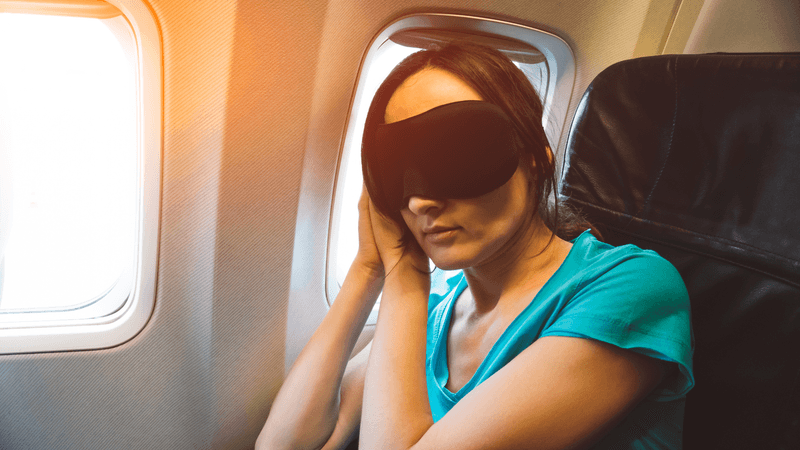
Light exercise can do wonders after a long flight. Stretching or a brisk walk boosts circulation and energy levels, helping to shake off the sluggishness of jet lag.
Engaging in physical activity upon arrival can also improve mood and reduce stress, making the adjustment to a new time zone smoother. Frequent flyers often incorporate short workouts or yoga sessions to refresh their minds and bodies.
The key is to keep it light. Overexertion might lead to more fatigue. Find a balance that invigorates without exhausting you, and make it part of your travel routine.
8. Plan Flights Strategically

Strategically planning your flight can ease the transition into a new time zone. Whenever possible, book flights that land in the early evening. This timing allows you to settle in and go to bed at a natural time after arrival.
Early evening arrivals can help you sync with the local bedtime, reducing the impact of jet lag. It’s a thoughtful approach that considers not just the duration of the flight, but the potential for a restful night’s sleep afterward.
While not always possible, aim for flights that support a smoother adjustment to your new environment. It’s about maximizing comfort and minimizing disruption to your body’s clock.
9. Use Sleep Aids with Caution
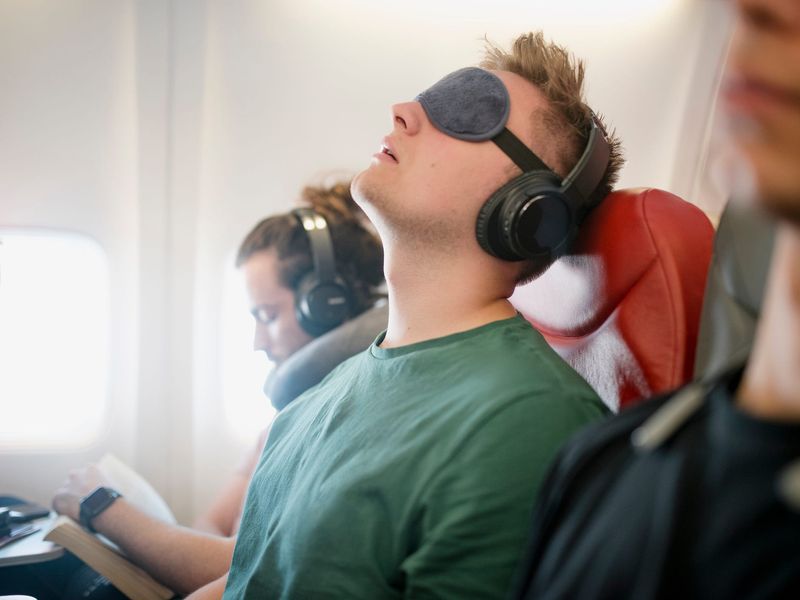
Some travelers resort to over-the-counter sleep aids for long-haul flights, but caution is advised. These should be a last resort and not used without consulting a doctor.
Sleep aids can help induce rest on a flight, but they may lead to grogginess or dependency if misused. The key is understanding your body’s needs and using these aids only when absolutely necessary.
Consider natural alternatives like herbal teas or breathing exercises. If you choose to use sleep aids, follow medical guidance to ensure safe and effective use.
10. Avoid Blue Light at Night

Blue light from screens can delay melatonin production, disrupting your sleep. Frequent flyers recommend switching devices to night mode or avoiding them altogether before bed.
The harsh glow of phones, tablets, and laptops can trick your brain into thinking it’s still daytime, making it difficult to wind down. Protect your sleep by limiting exposure at least an hour before bed.
Create a calming pre-sleep environment. Read a book or practice relaxation techniques instead. Prioritizing this change in routine can enhance your sleep quality and ease the adjustment to new time zones.
11. Wear Compression Socks
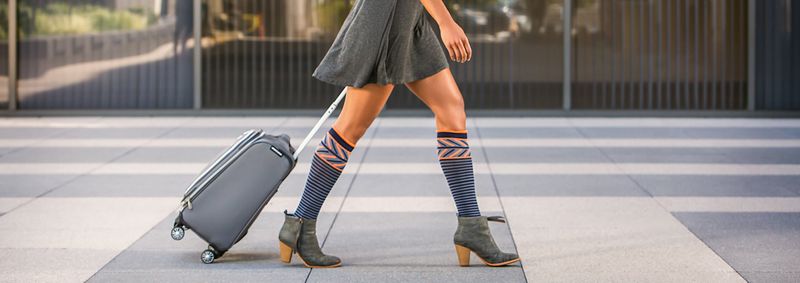
Compression socks are a traveler’s secret weapon. They improve circulation during long flights, reducing fatigue and swelling. These common post-flight issues can exacerbate jet lag.
Wearing compression socks can help keep your blood flowing, preventing discomfort that often accompanies long-haul travel. They are an easy addition to your travel wardrobe, offering health benefits that extend beyond the flight.
Choose colorful or patterned socks for a bit of fun. By alleviating physical strain, they contribute to a smoother recovery from jet lag and a more comfortable travel experience.
12. Eat Light Meals

Heavy meals can weigh you down during travel. Opting for lighter fare helps your digestion and keeps you feeling more energetic. Frequent flyers recommend sticking to salads, fruits, and lean proteins.
Digestive comfort can play a big role in how you feel when adjusting to a new time zone. Heavy, greasy foods can disrupt your sleep and leave you feeling sluggish.
Choosing meals that are light yet nutritious can make a difference in how your body copes with time changes. It’s about fueling up without overburdening your system, ensuring a better travel experience.
13. Try Adaptogenic Herbs

Adaptogenic herbs such as ashwagandha and rhodiola can support energy and stress levels during travel transitions. These natural remedies are favored by some frequent flyers seeking a holistic approach to jet lag.
These herbs are believed to help balance the body’s response to stress and fatigue, making them ideal for long journeys. They can be taken as teas, capsules, or tinctures to suit personal preferences.
Before trying adaptogens, consult with a healthcare professional to ensure they’re right for you. They offer a gentle means of supporting your body’s resilience during travel.
14. Practice Deep Breathing

Deep breathing exercises can calm your nervous system and promote sleep, especially in unfamiliar environments. Frequent flyers find this technique invaluable for relaxation and adjustment.
Take a few moments to focus on your breath, inhaling slowly and deeply through your nose, and exhaling through your mouth. This simple practice reduces stress and enhances sleep quality.
Incorporating mindfulness into your travel routine can help you cope better with the pressures of changing time zones. It’s a portable, cost-free method to support your well-being on the go.
15. Take a Cool Shower

A refreshing cool shower after you land can invigorate your senses and reduce travel fatigue. It signals your body that it’s time to be awake and alert, helping to combat the lethargy associated with jet lag.
Cold water can boost circulation and increase alertness, making it a favored remedy among seasoned travelers. It’s a simple yet effective way to wake up your body and mind.
Besides refreshing you physically, a cool shower can mentally prepare you for the new adventures ahead. It’s a quick reset for your energy levels and mindset.
16. Stick to a Sleep Routine

Consistency is key when adjusting to a new time zone. Sticking to a regular sleep routine helps your body adapt more quickly. Go to bed and wake up at the same time each day once you arrive at your destination.
This disciplined approach reinforces your body’s natural rhythms, making the adjustment period shorter and more manageable. It helps establish a new sense of normalcy amidst travel chaos.
Though challenging, maintaining this routine pays off. It reduces the groggy, misaligned feelings of jet lag, enabling you to enjoy your travels more fully.

